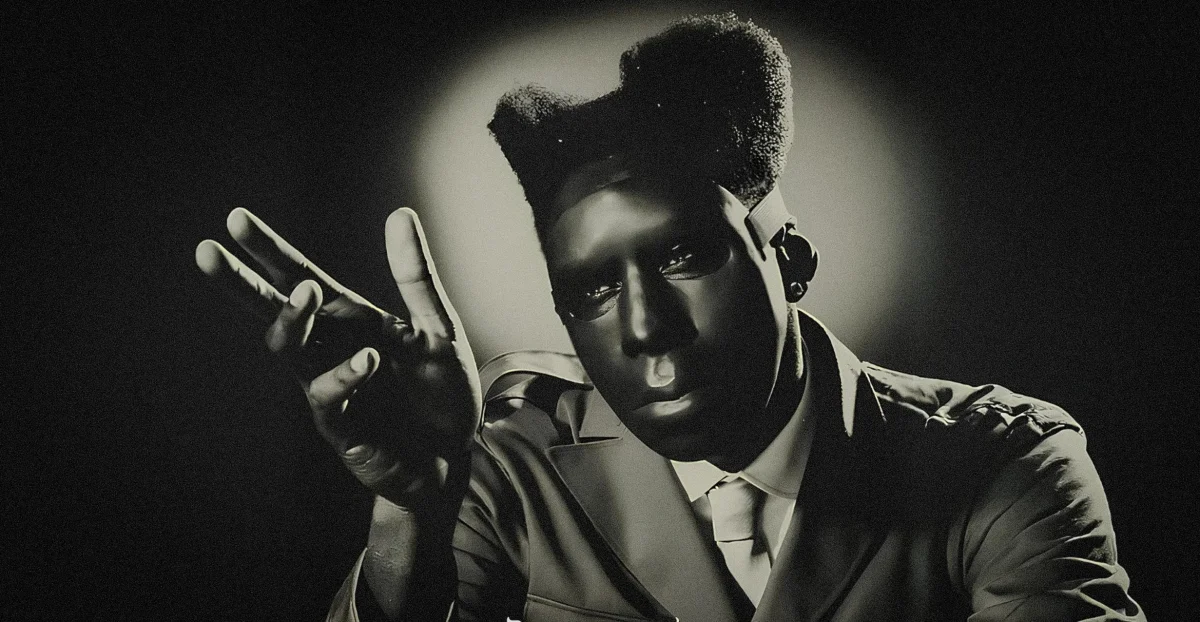In Chromakopia, Tyler, the Creator doesn’t just deliver music–he builds an auditory kaleidoscope that dives deeper into the layers of his persona, covering themes such as fatherhood, self-worth, distrust, and vulnerability.
Tyler, the Creator’s latest album marks another chapter in his career as an artist, and with this new release, he continues to evolve in his sound just like he did with albums Flower Boy, IGOR, and Call Me If You Get Lost, exploring more artistic and emotional themes every time.
With Chromakopia, he expands more into themes like self-reflection, family, fatherhood, and Black identity. For example, the tracks “Like Him” and “I Killed You” cover personal growth and social criticism, showing his vulnerability along with his boastfulness shown across his music.
The track “Like Him”, is one of the more prominent songs on the album because it speaks about Tyler’s relationship with his estranged father.
For the majority of his career, Tyler expressed anger towards his father for not being present in his life but this song shocked many listeners when his mother spoke on the song; she revealed that his father’s absence was her younger self’s fault and that she should be blamed rather than him.
Fatherhood is explored once again in “Hey Jane”, which is a song that highlights Tyler’s fears of becoming a father; he acknowledges his selfishness and that he doesn’t think he’s ready for that kind of role.
One song that contrasts with previous albums is “I Killed You”. In this track, Tyler encourages Black listeners to accept themselves as they are, fighting Western beauty standards when he speaks against changing anything about his hair simply because society has a different view on it. This song shows his growth in maturity because he previously avoided narratives about race.
Other than the themes on this album, Tyler once again manages to push the boundaries of sound and blends several different genres of music beautifully.
In Chromakopia, Tyler fuses different elements of hip-hop, soul, jazz, and classical music to enhance the emotions expressed in each song. “Rah Tah Tah” has a brash, energetic beat that pairs with Tyler’s lyrics that sound similar to his early career to pay homage to the rap styles that helped him at the beginning of his career.
“Tomorrow” is a more subdued and softer-sounding track that uses piano melodies to create an atmosphere of reflection that enhances the lyrics about the passage of time. The differences between these two tracks highlight Tyler’s versatility as an artist and producer.
One of my favorite tracks is “I Hope You Find Your Way Home”, which is a song that is deeply reflective and emotional, encapsulating the themes presented throughout the album. Musically this album stands out the most to me because the piano and use of string instruments pair together to create feelings of hope and fulfillment, which come together perfectly to close this album.
Chromakopia has a different listening experience from Tyler’s previous albums because of his significant growth as a person and more introspective approach; he allows the listener to gain a deeper understanding of his character and identity through unfiltered eyes. Usually in his projects, Tyler, the Creator plays a character with a different name as he did on IGOR and Call Me If You Get Lost, he played the characters Igor and Tyler Baudelaire respectively.
On Chromakopia, despite his persona wearing a mask to hide his face, this album feels the most vulnerable and exposed from Tyler. This idea makes the album a lot more interesting to me because it enhances the idea that Tyler makes “projects”, rather than just music.
Chromakopia is a musical experience that asks the listener to look inward to themselves and reflect on their relationships and identity. Tyler, the Creator’s expansion on the previously mentioned themes allows you to step into his shoes over the album and grapple with questions about forgiveness, self-worth, and identity. Take some uninterrupted time to sit down, relax your mind, and really pay attention to this album when you listen and reflect on how it resonates with you. Whether you relate to any of its messages or simply enjoy the artistry, Chromakopia deserves your full attention.









